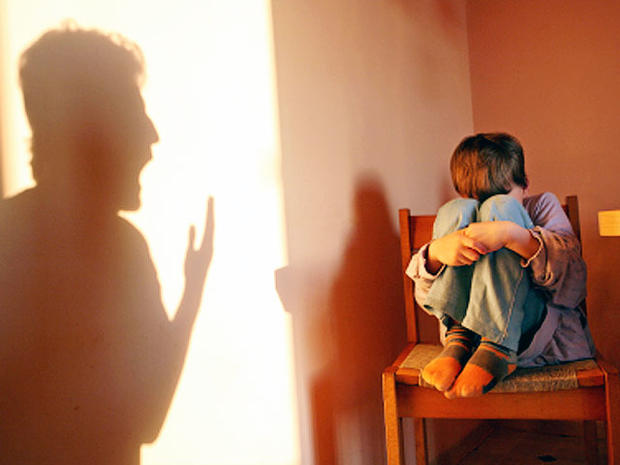Psychological abuse may be most prevalent form of child abuse, experts say
(CBS News) Research shows the adage "sticks and stones may break my bones, but words can never hurt me" isn't true, especially when it comes to the lives of young children.
Spanking, physical punishment may raise risk for mental health woes in adult years
A clinical report from child abuse experts, published July 30 in Pediatrics, says that psychological abuse can be as damaging to a young child's physical, mental and emotional health as some forms of physical abuse. What's more, such abuse is often under-reported and hard to detect since there are no visible abrasions or bruises, the researchers said, making it potentially the most prevalent form of child abuse and neglect.
While psychological abuse was recognized over 25 years ago, the researchers said few studies have looked at the rates of psychological abuse. Previous studies suggest about 8 to 9 percent of women and 4 percent of men in the U.S. and Britain said they suffered from severe psychological abuse in childhood.
According to the report's authors, psychological abuse may include acts like belittling, denigrating, terrorizing, exploiting, being emotionally unresponsive or corrupting a child to the point his or her well-being is at risk. It can also include withholding love, having unrealistic expectations or forcing the child to participate in dangerous situations. Examples may include a mother leaving her infant alone in a crib all day or a father involving his teenager in his drug habit. While a parent raising their voice for the eighth time to get a child to put on their shoes wouldn't be abuse, yelling at the child and telling them that they are a terrible person daily would be.
"We are talking about extremes and the likelihood of harm, or risk of harm, resulting from the kinds of behavior that make a child feel worthless, unloved or unwanted," report author Dr. Harriet MacMillan, a professor of psychiatry and behavioral sciences at McMaster University in Ontario, Canada, said in the press release.
Psychological abuse has been linked with development problems, such as attachment disorders, socialization problems, disruptive behavior and emotional problems.
"The effects of psychological maltreatment during the first three years of life can be particularly profound," MacMillian said.
She added to HealthDay that the main message of her report was that psychological abuse was just as bad as other forms of abuse.
"We know that exposure to other types of maltreatment like physical and sexual abuse can be associated with a broad range of types of impairment in physical and mental health, and cognitive and social development," MacMillian said. "Similarly, we see these types of impairments associated with psychological maltreatment."
In some cases, physical abuse was coupled with psychological abuse. Sometimes, a child perceived the psychological abuse as worse than the actual hitting.
"I once had a child who talked about being hit by his dad," MacMillan said to HealthDay. "The child said that the dad says things about me that make me feel badly, worse than the hitting."
The researchers said that doctors should be more alert to signs of psychological abuse in kids, and encourage pediatric, psychiatric and child protective services to work together when an at-risk child is identified. Out-of -home care interventions are typically used in physical and sexual abuse cases, and the researchers argued that victims of psychological abuse may also need this form of outside help. The authors added that more research needs to be done to develop and test effective treatments for children who have suffered from psychological abuse.
The National Health Institutes' of health has more on child abuse.
